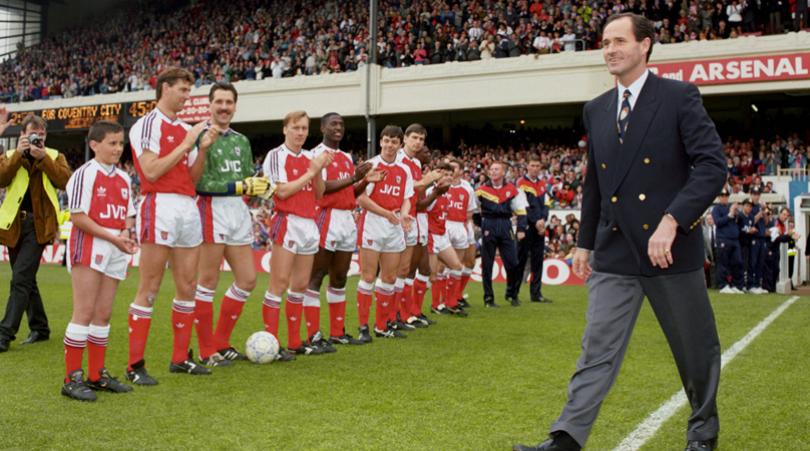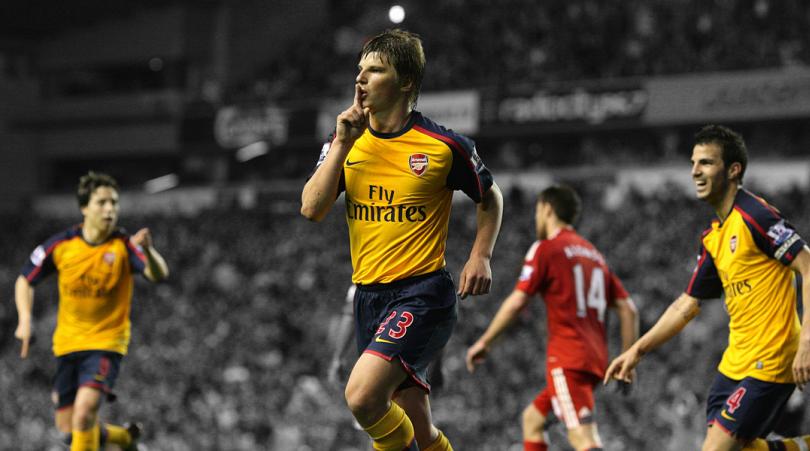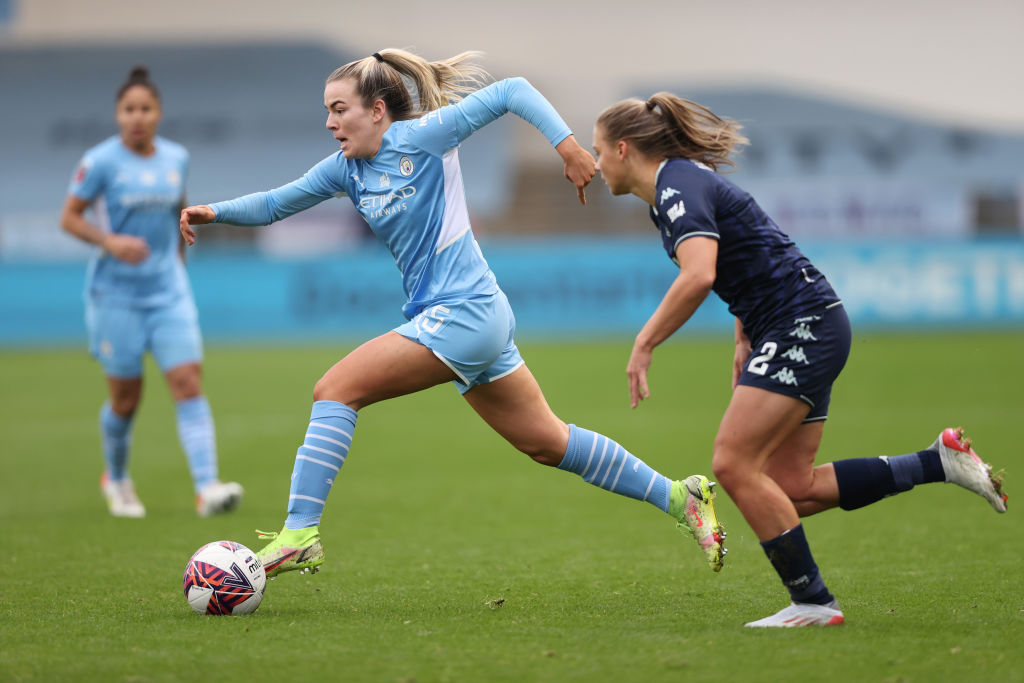Football's greatest-ever title finish? Arsenal's 1989 triumph over Liverpool, told by the players
Before Aguero there was this: George Graham’s rebuilt Arsenal against Liverpool in the final 90 minutes of the entire season. But as a TV audience of millions watched on, no one would have predicted its dramatic conclusion
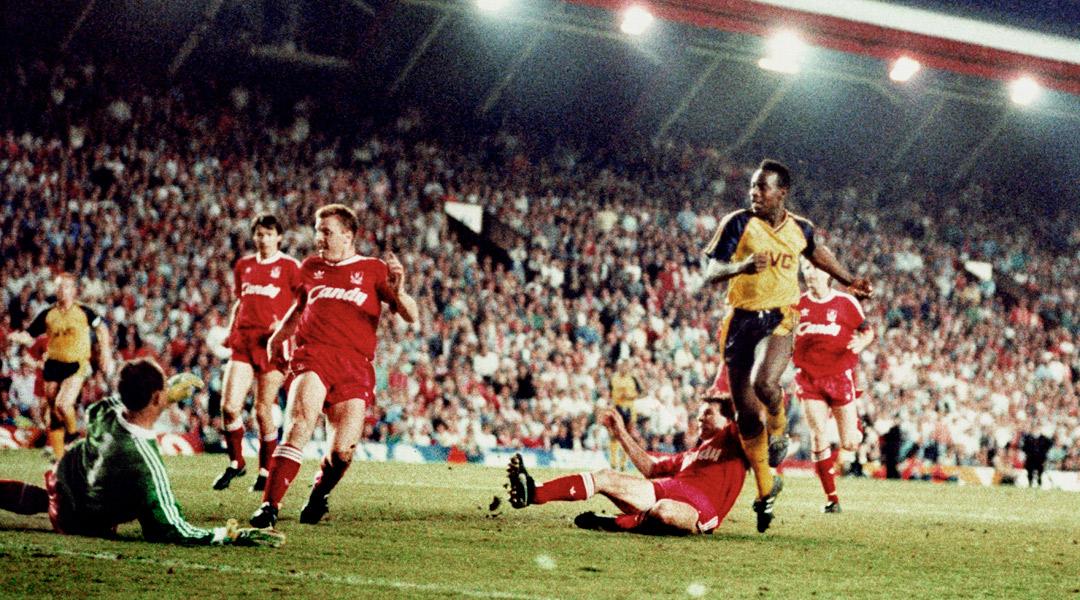
“Please, please, please, please, please, just f***ing... F*** OFF! You have arrived during the worst 60 seconds of my life and I really don’t want to see you.”
It’s 10pm on May 26, 1989. In a flat in Highbury, north London, the buzzer has sounded and Paul, the Arsenal-obsessed protagonist of Nick Hornby’s Fever Pitch film adaptation, is understandably irate. The visitor couldn’t have called at a worse time. Approaching injury time in the Division One championship decider at Anfield, Arsenal lead Liverpool 1-0, but desperately need a second goal to steal the title.
The referee stops the game so Arsenal’s Kevin Richardson can receive treatment for cramp. Mad-eyed midfielder Steve McMahon tells his Liverpool team-mates there’s just “one minute” remaining, signalling forcibly with his right index finger. John Barnes and John Aldridge exchange a ‘tag’ of the hands. They think it’s all over.
So does Paul and, believing it might be love interest Sarah at the door, dashes downstairs and into the street, leaving best mate and fellow Gooner, Steve, alone in agony in front of the television. But when Paul returns moments later, Michael Thomas is through on goal with just Bruce Grobbelaar to beat...
For fans of Liverpool and Arsenal, the difference between Thomas scoring and missing was the difference between agony and sheer, unadulterated ecstasy
For fans of Liverpool and Arsenal, the difference between Thomas scoring and missing was the difference between agony and sheer, unadulterated ecstasy on the other. For millions more watching live on TV, it was the most dramatic sporting moment of that or any other year. It was also a far cry from the Premiership procession we’ve become accustomed to. In 1999/2000, Manchester United won the title by 18 points. Last season, Arsenal finished 11 points clear.
Yet as Liverpool and Arsenal squared up in 1989, it was 47 years since an entire season had gone down to the final day between the two top teams when the Busby Babes beat Arsenal 6-1 at Old Trafford to claim their first title. It wasn’t expected to conclude that way in 1952, and it certainly wasn’t expected to play out that way in 1989.
Rank outsiders
Get FourFourTwo Newsletter
The best features, fun and footballing quizzes, straight to your inbox every week.
Arsenal had no more than an outside chance of winning their first League title for 18 years, having finished sixth the previous season
In August 1988, Arsenal had no more than an outside chance of winning their first League title for 18 years, having finished sixth the previous season. A double winner as an Arsenal player, George Graham had been manager for little over a year, and had extensively rebuilt his team. Out went Viv Anderson, Kenny Sansom, Steve Williams, Graham Rix and Charlie Nicholas, and in came centre-forward Alan Smith, winger Brian Marwood, midfielder Kevin Richardson and defenders Lee Dixon, Steve Bould and Nigel Winterburn. The new signings joined home-grown quartet Tony Adams, David Rocastle, Michael Thomas and Paul Merson, with David O’Leary, John Lukic and Paul Davis retained.
It was a time of transition. The new names expected to take time to find their feet, and expectations were low. “Liverpool were going to win the league,” says Arsenal fan Robert Frumkin. “Second or third would have been good for us.”
But Tony Adams thought differently. The day after England’s first-round exit at the 1988 European Championship, the Arsenal skipper bet ITV’s perma-tanned football anchor Jim Rosenthal £50 that the Gunners would come out on top the following season. With Liverpool overwhelming favourites to defend their title, Rosenthal’s money seemed safe.
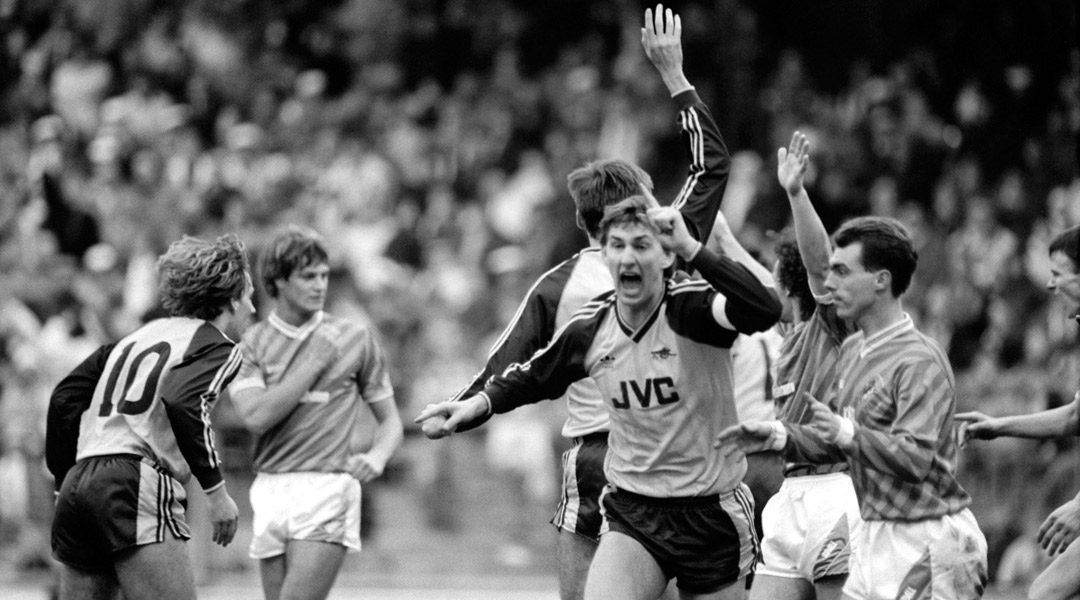
For the 22-year-old, though, winning the league became a personal crusade. Turned inside out by Marco van Basten during England’s defeat to Holland, Adams had come to be viewed by the media as the embodiment of everything that was wrong with the English defender: too slow, too agricultural, too uncultured.
Having been made the scapegoat for England’s failure, Adams began the season being subjected to donkey noises from opposing fans. It got progressively worse, the low point coming after a 1-1 draw at Old Trafford, when he scored at both ends. The following day, he looked at the back page of the Daily Mirror and saw a picture of himself with a pair of donkey’s ears attached to the side of his head. Privately, the criticism hurt Adams. Publicly, it motivated him. “I thought: we’re going to win the League and show them,” he later remembered.
In his autobiography Addicted, Adams boasts that Arsenal “squeezed and squeezed teams, then squeezed them more”, using the Highbury pitch – one of the smallest in the First Division – to pressurise their opponents in all areas of the field. In fact, Arsenal were more successful away from home, winning 12 games on their travels, soaking up pressure before hitting teams on the counter-attack. At Highbury, where the onus was on them to dictate the pace of the game, they fared worse with just 10 victories – an unusually low number for a team with title aspirations.
Everton 0-0 Liverpool, May 3
Liverpool 1-0 Nott Forest, May 10
Wimbledon 1-2 Liverpool, May 13
Liverpool 2-0 QPR, May 16
Liverpool 5-1 West Ham, May 23
Labelled a long-ball team in certain quarters, Arsenal under Graham relied heavily on moving the ball forward quickly – not unlike Sven-Göran Eriksson’s approach with England. But whereas Eriksson’s England look to hit balls over the top or through the channels for Michael Owen, Graham’s Arsenal looked to Smith’s close control and aerial ability to bring the likes of Merson, Marwood and Rocastle into the game. “They’re fast, fit and pragmatic,” was David Lacey’s diplomatic interpretation of Arsenal’s strengths in The Guardian.
“We played some good stuff,” counters Smith. “And we were the division’s highest scorers, so we couldn’t have been boring.”
At Anfield, however, ‘pass and move’ was still very much the Liverpool groove. The Reds had won the title by nine points the previous season and with Ian Rush returning from Juventus to bolster an attack already boasting Aldridge, Barnes and Peter Beardsley, they now looked even stronger.
Arsenal 1-0 Newcastle, Apr 15
Arsenal 5-0 Norwich, May 1
Middlesbro' 0-1 Arsenal, May 6
Arsenal 1-2 Derby, May 13
Arsenal 2-2 Wimbledon, May 17
“We’d lost that glow of invincibility at the 1987 Littlewoods Cup Final,” admits Liverpool fan Anthony Teasdale, recalling Arsenal coming from behind to beat Liverpool 2-1, “but you just couldn’t see anyone but us winning the league that year.”
Even so, Liverpool’s form leading up to the turn of the year was patchy, largely due to injuries to Rush and Alan Hansen. When Arsenal hit the front for the first time on Boxing Day, Liverpool were sixth. And by the time the Gunners demolished fellow title contenders Everton at Goodison Park on January 14, leaving them 11 points clear of Liverpool, the bookmakers had installed Graham's men as odds-on favourites.
But the tag didn’t stick comfortably to Arsenal. “There was still an underlying fear that we might make a mess of it,” admitted Adams, reflecting on 19 dropped points between January and the season’s end.
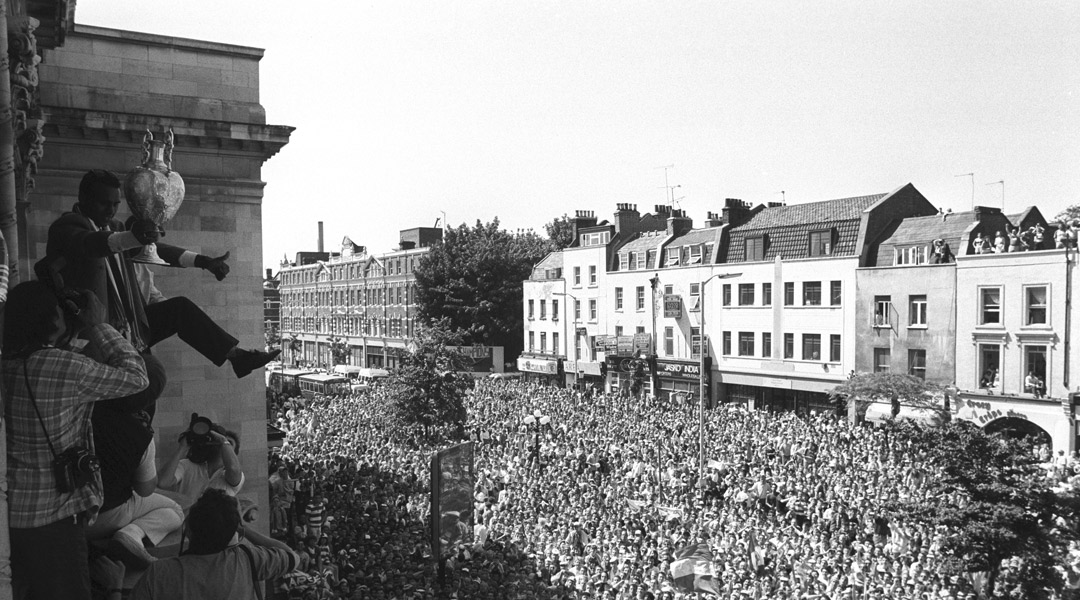
As the Gunners wobbled, Liverpool grew ever stronger. After losing at Old Trafford on New Year’s Day, the Reds won 15 of their next 18 league games – drawing the other three – to gradually erode Arsenal’s lead. In early April, Liverpool thumped Sheffield Wednesday 5-1 to finally top the table and everybody outside Highbury assumed the writing was on the wall. Arsenal returned to the summit with a 1-0 win over Newcastle, but Liverpool would regain the lead if they won their game in hand. First, though, there was the small matter of an FA Cup semi-final against Nottingham Forest.
That the top two teams would play each other on the last day of the season to decide the title was not just a happy coincidence thrown up by the fixture list. On April 15, 96 Liverpool fans were crushed to death at Hillsborough. The match was abandoned and Liverpool’s next two league games were postponed as the club, its supporters, the nation and the football world mourned.
After the Wimbledon game we did a lap of honour to thank the Highbury crowd for their support and they clapped us as if to say, ‘Well done, hard luck’
Rearranging the fixtures, the Football League realised they had a potential decider on their hands, so switched Liverpool’s home game against Arsenal from April 22 to Friday, May 26. Kicking off at 8.05pm, the final act was to be screened live on ITV.
Between May 3, when they drew with Everton, and the showdown with Arsenal, Liverpool played and won six times. Arsenal, who had to play just three times during the same period, contrived to drop five points at home, losing to Derby before drawing with Wimbledon in their penultimate game. If anybody looked tired, it was Graham’s men. In truth, the pressure had told. “You get on edge and forget what got you there in the first place,” explains Smith. “After the Wimbledon game we did a lap of honour to thank the Highbury crowd for their support and they clapped us as if to say, ‘Well done, hard luck’. Even the chairman came into the dressing room afterwards to say ‘You’ve had a great season, you’d done us proud.’ He didn’t say, ‘You’ve had it now’, but you could read between the lines.”
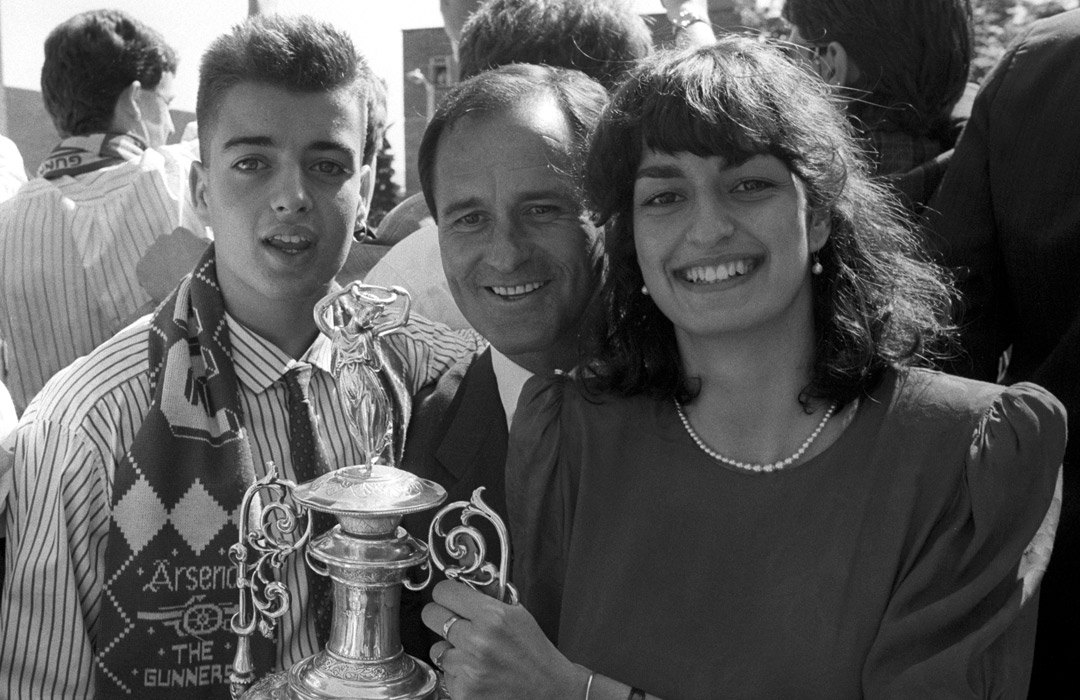
With the media already writing off Arsenal’s chances of victory at Anfield, Liverpool entertained West Ham on the Tuesday night, knowing that victory would leave them needing just a draw against the Gunners three days later. Hoping the relegation-threatened Hammers would do them a favour, Arsenal could only watch in horror as Liverpool won 5-1, relegating West Ham and dictating that only defeat by a two-goal margin would take the title south.
“I remember I was at the Football Writers’ dinner when Liverpool played West Ham,” recalls Smith. “They kept scoring, two, three, four... and we kept saying, ‘How many have we got to beat them by now?’”
Michael Thomas was equally confused. “Then George came over, messing around, punching me in the arm, saying, ‘Two-nil? Not a problem!’”
Fuel the fire
We’re not worried about Arsenal now
Sensing the tension in his players, Graham gave them two days off after the Wimbledon game, leaving others to motivate his team. “But for injuries [to Liverpool], the climax would doubtless not have been so belated,” said The Times. “For the sake of the English game, Liverpool must win,” said Charlie Nicholas, referring to the respective styles of play and clearly still smarting having been forced out of Highbury by Graham. “You don’t have a prayer, Arsenal,” added the Mirror, while The Sun opined that the Gunners were there to make up the numbers.
“We’re not worried about Arsenal now,” said Liverpool midfielder Steve McMahon, echoing The Times’ opinion that an Arsenal triumph was clearly “Impossible”.
Graham, though, remained in ebullient mood: “We don’t concede anything. Why should we? I firmly believe we can win at Anfield and my players do as well.”
According to Smith, the mood in training was the most relaxed he can ever remember in the build-up to a match. “It was one of those games where we just thought, well, nobody fancies us, we know what we’ve got to do, we might as well just go up there and give it a shot. But I didn’t expect us to win.”
For the sake of the English game, Liverpool must win
But Thomas, and others in the camp, did. “It was Liverpool, we’d played against them before, there was no fear factor, but our frame of mind was made easier because we were expected to lose.”
With the pressure off, Graham performed one last motivational trick to ensure his team remained fully focused. On the coach up to Merseyside, he took out a newspaper article and passed it round. In it, Anfield legend Graeme Souness wrote off the Gunners as “boys” against Liverpool’s “men”. Graham’s “boys” could not have been more ready.
Liverpool hadn’t been beaten by two goals at Anfield for three years. Arsenal hadn’t won there for 14. Despite their impressive away form, the odds were stacked against them being crowned champions – 7/1 against, if the bookmakers were to be believed. “We thought we’d blown it,” admits Robert Frumkin. “Win 2-0 at Anfield? Yeah, right.”
The red half of Merseyside also expected to come out on top, even though this was Liverpool’s third game in six days. “It was nice to have some real competition for a change,” says Anthony Teasdale, “but I was confident we’d do it.”
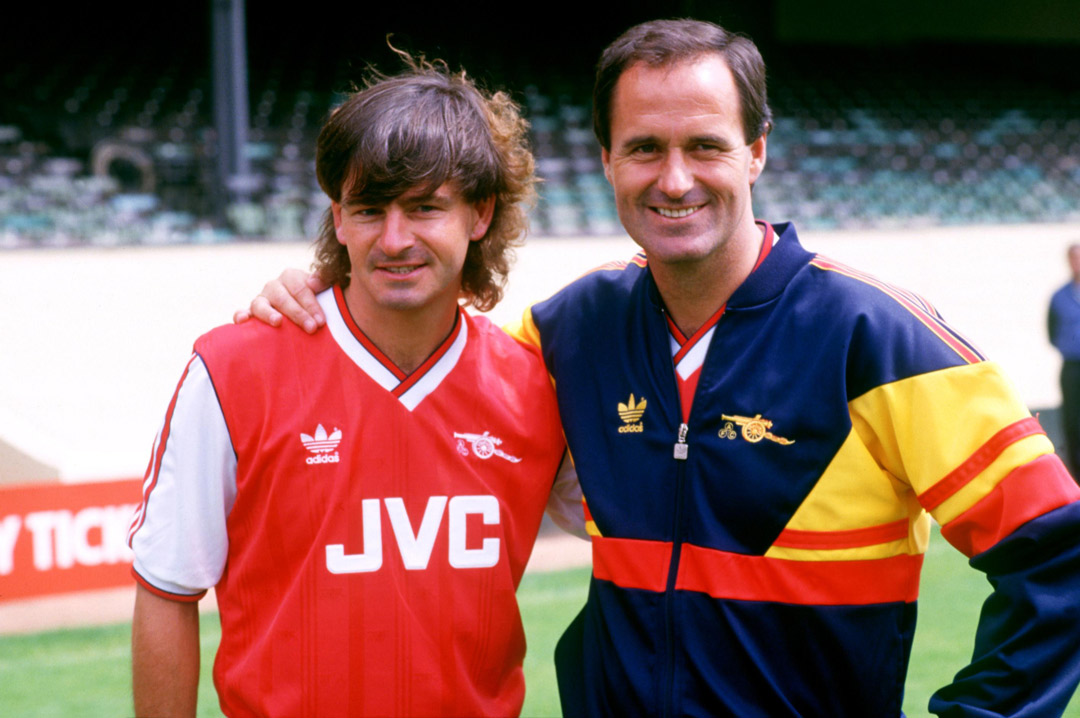
In his team talk, Graham preached caution. “Keep it tight, keep it tight, don’t let them settle,” he stressed. “Pressure, pressure, pressure all over the field. I won’t be too disappointed if it’s 0-0 at half time.”
Graham had a game plan. If Liverpool scored first, he reasoned, Arsenal’s heads might drop. If it was goalless at the interval, doubts might creep into Liverpool’s play and if Arsenal nicked a goal early in the second half, doubt could turn to panic. Liverpool, on the other, didn’t quite know how to approach the game. “If you know you have to avoid getting beaten by two clear goals, you don’t play your natural game,” explains Ray Houghton. “What do you do? Do you sit back?”
Crammed in among the 4,000 Arsenal fans, Frumkin describes the atmosphere as the best he’s ever experienced, a heady brew of “energy, passion and emotion”. But with Hillsborough fresh in the memory, Liverpool’s fans were less hostile to visiting teams than they had previously been.
Before kick-off, Arsenal handed bouquets of flowers to supporters around the ground and presented a cheque for £30,000 to the Hillsborough Disaster Fund. But as the game kicked off, it soon became apparent that their generosity ended there.
“The tackling was ferocious. Seldom can English football have been played with such intensity,” said The Independent’s Patrick Barclay of Arsenal’s first half. The Gunners made it impossible for Liverpool to play their usual passing game, restricting them to a couple of long-range efforts. Ian Rush pulled his groin dispatching one of them, but even with Beardsley on in his place, Liverpool struggled to keep possession.
Graham's game
Arsenal’s game plan was working to perfection – and causing confusion among the Liverpool players. “The onus was on them to attack – they needed to win by two goals – but they just sat back,” says Houghton. “That put us off our stride. Maybe they were thinking, 'These boys have played a lot of games, they must be emotionally drained, maybe we can nick a couple of goals late on'.”
Yet while it remained goalless, Liverpool were happy. “Kenny Dalglish’s team talk just said more of the same,” recalls Houghton. “Arsenal still needed to score twice.”
Having created the best chance of the first half – Steve Bould’s header from Thomas’s cross being cleared off the line by Steve Nicol – Arsenal began the second with more attacking intent. On 52 minutes, they won an indirect free-kick on their right, level with the Liverpool penalty area. Nigel Winterburn drifted in the cross and Smith flicked his header into the bottom left-hand corner of the net. One-nil. Or was it? As the ball crossed the line, the linesman raised his flag, then lowered it again. The Liverpool players appealed.
“But they were caught in two minds,” says Smith. “They didn’t know whether to appeal for offside or claim I hadn’t touched the ball.” After consulting his linesman, referee David Hutchinson rightly gave the goal: television replays show that Smith was onside and had clearly touched the ball, even though it barely changed direction. “People still don’t believe I touched it,” says Smith.
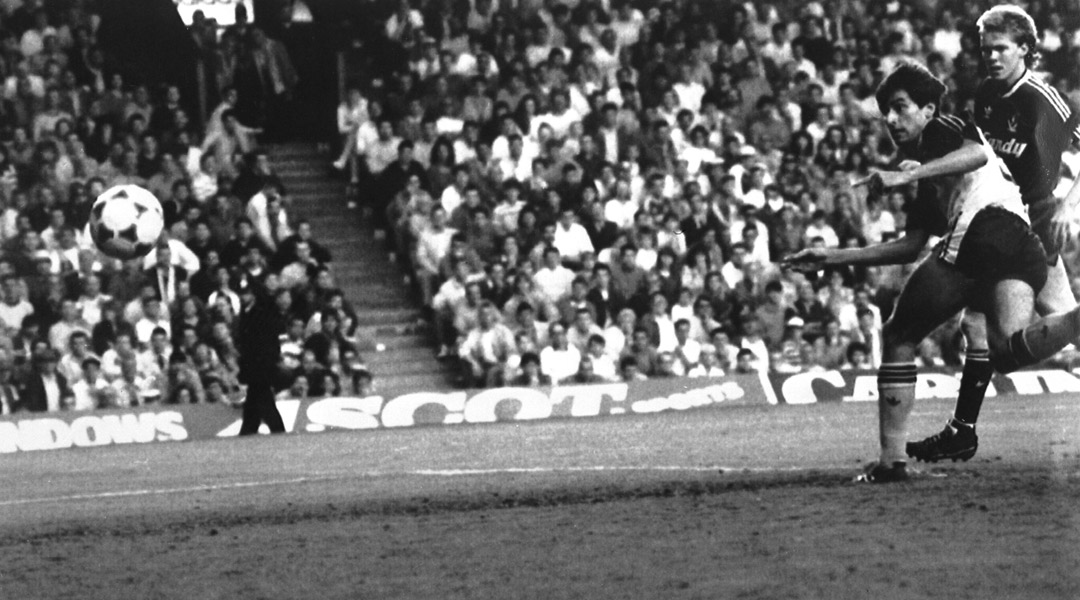
Both teams had a hand on the trophy, but it was still Liverpool’s to release. “Even at 1-0 down I still thought we’d win the Championship,” said John Barnes, but confidence was coursing through the Arsenal players: “Once we got the first, I knew we’d get the second,” reckons Thomas.
As Graham predicted, Liverpool became edgy, repeatedly surrendering possession as they struggled to cope with Arsenal’s energy. Twice Gary Ablett came to the rescue, first clearing the ball after Grobbelaar had dropped a cross, then making a vital tackle as Richardson wound up a shot inside the box.
Then, on 74 minutes, came the chance that Arsenal had been patiently waiting for. Richardson worked the ball to Thomas just inside the area, but with the goal at his mercy he dragged the ball wide. As the game ebbed and flowed, Liverpool spurned a golden chance to kill the game off; Aldridge flicking on to Houghton, only for the midfielder to volley high into the Kop.
I always remember Kenny Dalglish throwing the ball back so it just caught the edge of the pitch and bounced back towards the dugout. It was just time-wasting
From Liverpool’s perspective at least, the shot had eaten away at precious seconds as the clock ticked on towards 90 minutes. “One thing I always remember is Kenny Dalglish getting the ball when it went out for a throw-in and throwing it back so it just caught the edge of the pitch and bounced back towards the dugout,” recalls Smith. “It was just time-wasting, because the Anfield crowd were whistling for full time. There’s no clock at Anfield, so the players didn’t know how long was left, and the crowd just started whistling at around 87 minutes.”
“Those last few minutes of the match seemed to take forever,” recalled Aldridge. “Even when it was clear that the 90 minutes were up and there was only stoppage time left, we were still all on edge, fearing that Arsenal would score a second.”
History boys
With a minute of normal time remaining, John Barnes picked the ball up on Liverpool’s right and made for the corner flag. Leaden-legged, Tony Adams slid in, but Barnes skipped round him. “What I did next,” remembered Barnes, “cost Liverpool the Championship.” Having spotted Richardson closing him down, Barnes elected to dribble past the exhausted midfielder instead of playing keep-ball in the corner. Sticking out a leg, Richardson somehow dispossessed Barnes and poked the ball back to his John Lukic (the backpass had yet to be outlawed).
What I did next cost Liverpool the championship
“Just kick it John, for f***’s sake!” screamed Adams, but Lukic chose to ignore his captain and bowl out the ball to Lee Dixon on the right.
“Usually when a goalkeeper was about to throw a ball out and I was nearby, I’d raise my hands in an effort to stop him,” said Aldridge. “For some reason – I don’t know why – I didn’t do it on this occasion.”
As Dixon prepared to propel the ball into Liverpool territory, Brian Moore cleared his throat on ITV. “And Arsenal come streaming forward now, in surely what will be their last attack,” he roared. “A good ball by Dixon, finding Smith... ”
Killing the ball just inside the Liverpool half, Smith turned infield and spotted the charge of Michael Thomas. A millisecond later, Moore spotted it too...
“For Thomas, charging through the midfield! Thomas!”
Attempting to clip the ball past Nicol, the ball hit the defender, rebounded off Thomas and into the midfielder’s path, leaving him through on Grobbelaar’s goal...
“It’s up for grabs now!”
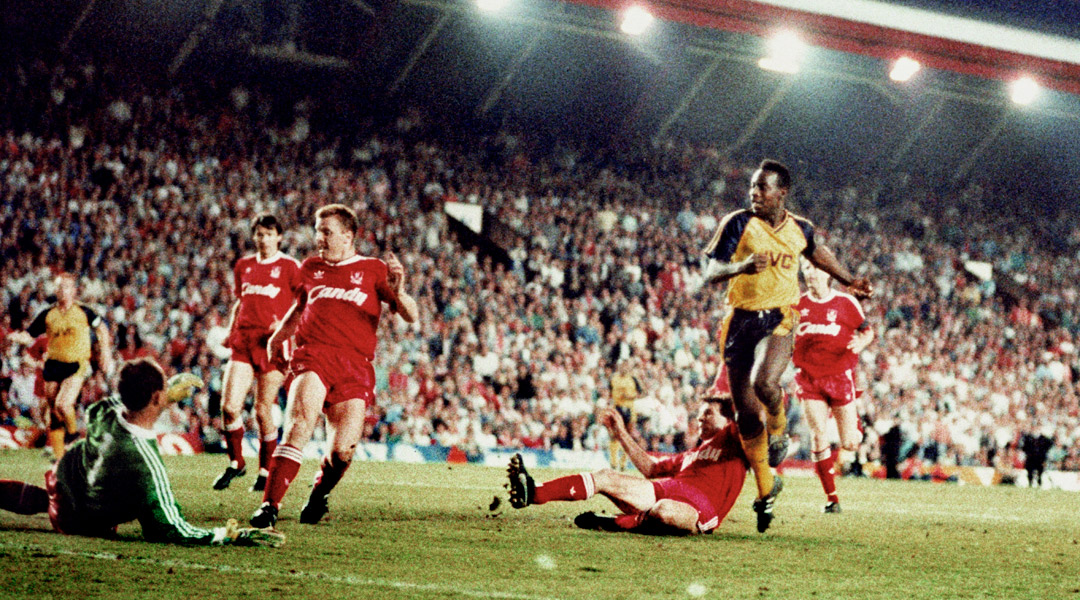
As Moore prepared to explode and a nation sat forward in their seats, Graham screamed: “Shoot! Shoot!” But with chaos unfurling all around him, a moment of Zen-like calm washed over Thomas. “Once I was through, I didn’t notice anything going on around me,” he says. “It was like time slowed down. I just thought, I’m through, and waited for Bruce Grobbelaar to go down.”
With the outside of his right foot, Thomas flicked the ball over the legs of the advancing Grobbelaar and into the bottom right-hand corner of the net, sending the Arsenal fans behind the goal delirious, not to mention Brian Moore...
“THOMAS! Right at the end!!”
“In my commentating life I’ve churned out some respectable lines, but this one people are happy to use as a greeting,” said Moore, who died in 2001. “I was in a taxi driving round Piccadilly Circus once when the driver, an Arsenal fan, suddenly and joyfully started repeating the full last minute of my commentary on that night. He knew it word for word. His video of that game must be worn out – and his family with it.”

“My biggest regret is that I didn’t bring Thomas down,” remembers Ray Houghton, still rueful 16 years on. “Just as he was getting ready to strike it, I could have. The thing was, he’d been through earlier and put it past the post and I didn’t want to be the bad boy. If they scored from the penalty I didn’t want to be remembered as the one who gave it away. It’s amazing the thoughts that go through your head in a situation like that.”
Liverpool still had time to launch one last attack, but the ball fell to Thomas, this time in his own area. Instead of panicking and hoofing it into the crowd, Thomas calmly brought the ball under control and passed it back to Lukic. This time he did “just kick it” and the final whistle blew.
After-party
The Liverpool players slumped to the turf, ‘shell-shocked’, ‘distraught’ and ‘too upset to talk’
The Liverpool players slumped to the turf, “shell-shocked”, “distraught” and “too upset to talk”. As the jubilant Gunners paraded the trophy, they received a standing ovation from the crowd. The Kop even chanted “Champions, Champions”.
Surprisingly, Graham showed little emotion, exchanging “the most formal of hugs” with Adams, before leaving the raucous celebrations to his players. The Gunners sprayed the best part of 200 bottles of Champagne – kindly donated to them by Liverpool – and drank the rest. “By the time ITV came in the dressing room to interview me, I was drunk,” says Smith. “When I joined up with England a couple of days later, the doctor had to give me an injection in my arse for alcoholic poisoning.”
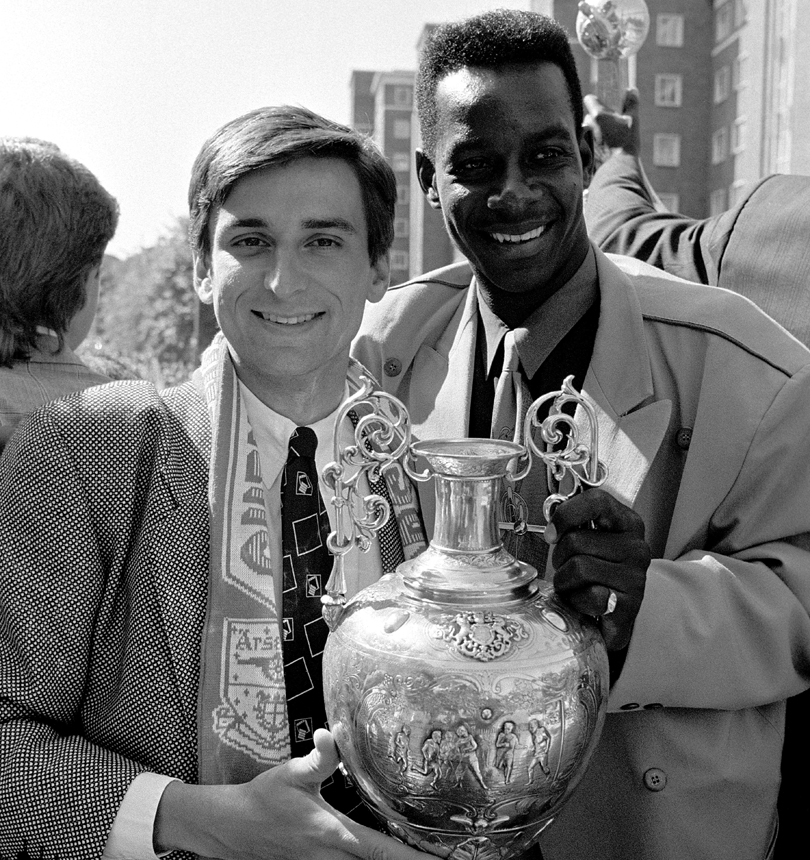
Having thanked the media for motivating his team, Graham sported a gargantuan grin on the team coach, as his players sang themselves hoarse on the journey home.
But as gracious as they were in defeat, to a man the Liverpool players – and their manager – believe that without the fixture congestion caused by Hillsborough, the title would have been theirs. Yet Liverpool didn’t appear tired as they thrashed the Hammers just three days before the title decider. “Perhaps it was a game too far,” offers Houghton. “If it had been anybody other than Arsenal, we might have been OK. They came to do job on us and fair play to them, they deserved it.”
Such grudging praise made victory no less sweet for Graham. In hindsight, he performed a stroke of managerial genius, the game unfolding just as he had predicted. No wonder he rates that victory over Liverpool as Arsenal’s greatest ever. You could even argue that it was one of the greatest victories in football history. Certainly, the Daily Mail’s Jeff Powell couldn’t be accused of hyperbole when he said: “Never in the history of English football has the championship been won so late, so improbably, so narrowly or with such glory.”
